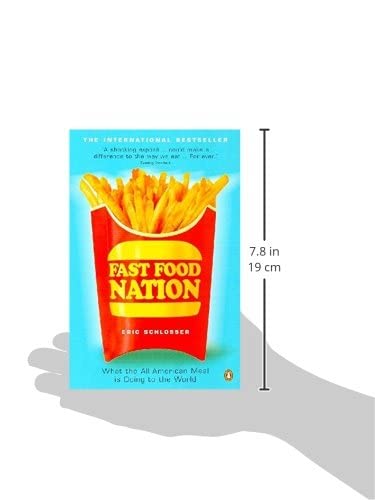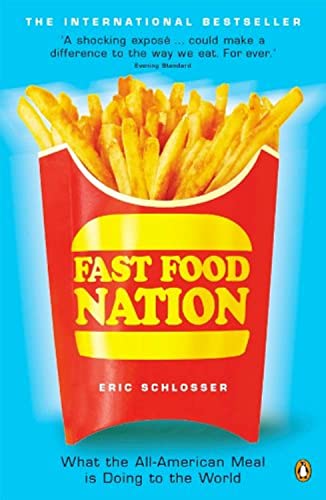Impact of Fast Food on Globalization: How the All-American Meal is Influencing the World
In Fast Food Nation: What The All-American Meal is Doing to the World, author Eric Schlosser takes readers on a journey through the history and impact of the fast food industry. From the origins of fast food giants like McDonald’s to the exploitation of workers and the environmental consequences of mass production, Schlosser sheds light on the dark side of this pervasive industry. Through research and interviews with industry insiders, he reveals the hidden costs of cheap and convenient fast food, prompting readers to rethink their choices and consider the broader implications of their food consumption. Fast Food Nation is a provocative and eye-opening exploration of how the all-American meal is shaping the world around us.





Fast Food Nation: What The All-American Meal is Doing to the World Plot Summary
Fast Food Nation: What The All-American Meal is Doing to the World by Eric Schlosser is a non-fiction book that explores the impact of the fast food industry on American society and the world at large. The book delves into the history, practices, and consequences of the fast food industry, shedding light on the unhealthy and unsustainable practices that underlie this multi-billion dollar business.
The book begins by tracing the rise of the fast food industry in America, highlighting the role of companies like McDonald’s in shaping the American diet and culture. Schlosser takes the reader on a journey through the history of fast food, from the origins of McDonald’s in California in the 1940s to the industry’s global expansion in the present day. He examines the ways in which fast food chains have transformed the way we eat, from the standardization of food production to the proliferation of unhealthy and cheap options.
One of the key themes of Fast Food Nation is the impact of the fast food industry on public health. Schlosser discusses the rise of obesity and other health problems in America, linking them to the high consumption of fast food. He argues that the fast food industry’s reliance on processed, high-calorie foods has contributed to the epidemic of obesity and related diseases in the United States. Schlosser also explores the ways in which fast food companies target children and teenagers through advertising and marketing, influencing their eating habits from a young age.
In addition to its effects on public health, Fast Food Nation also addresses the environmental and social consequences of the fast food industry. Schlosser discusses the environmental impact of factory farming and meat production, highlighting the ways in which large-scale livestock operations contribute to pollution, deforestation, and animal cruelty. He also explores the social implications of the fast food industry, examining the low wages and poor working conditions faced by many fast food workers, as well as the exploitation of immigrant labor in the industry.
Throughout the book, Schlosser paints a grim picture of the fast food industry, portraying it as a powerful and destructive force that is reshaping American society and the world at large. He argues that the fast food industry prioritizes profit over people and the planet, leading to widespread health problems, environmental degradation, and social inequality. However, he also offers some hope for change, highlighting the efforts of activists, policymakers, and consumers who are working to hold the fast food industry accountable and promote healthier, more sustainable food options.
Overall, Fast Food Nation is a powerful and eye-opening exploration of the hidden costs of the fast food industry. Through meticulous research and compelling storytelling, Eric Schlosser offers a critical analysis of an industry that has become a ubiquitous and influential part of American culture. By shining a light on the practices and consequences of the fast food industry, Schlosser invites readers to question their own consumption habits and consider the broader implications of their food choices. Fast Food Nation is a must-read for anyone interested in food, health, and the impact of corporate power on society.
Fast Food Nation: What The All-American Meal is Doing to the World Key Takeaway
One key takeaway from the book “Fast Food Nation: What The All-American Meal is Doing to the World” is the detrimental impact of the fast food industry on society, the economy, and the environment. The author, Eric Schlosser, highlights how the fast food industry has transformed the way we eat, work, and live, ultimately leading to a host of negative consequences.
One of the most alarming revelations in the book is the exploitation of labor within the fast food industry. Schlosser exposes how fast food companies often prioritize profits over the well-being of their employees, leading to low wages, poor working conditions, and a lack of job security. This not only affects the individuals working in these establishments, but also contributes to larger societal issues such as income inequality and poverty.
Additionally, Schlosser delves into the environmental impact of the fast food industry, focusing on issues such as deforestation, water pollution, and the overuse of pesticides and chemicals in food production. The book highlights how the mass production and consumption of fast food contribute to climate change and environmental degradation, ultimately harming both the planet and the health of its inhabitants.
Overall, “Fast Food Nation” serves as a wake-up call to consumers, urging them to consider the ethical and environmental implications of their food choices. The book encourages readers to be more conscious of where their food comes from and how it is produced, and to support sustainable and ethical practices in the food industry. It is a powerful reminder that our food choices have far-reaching consequences, and that by being more informed and thoughtful consumers, we can help create a healthier, more sustainable future for ourselves and for the world.
Conclusion
In conclusion, Fast Food Nation is a thought-provoking and eye-opening exploration of the fast food industry and its impact on society, health, and the environment. The book delves deep into the origins of fast food, the exploitation of workers, the manipulation of consumers, and the alarming consequences of mass consumption of convenient, cheap, and unhealthy food.
This book is a must-read for anyone interested in understanding the hidden costs of the fast food industry and the repercussions of our fast-paced, convenience-driven culture. Readers who enjoy investigative journalism, social commentary, and food-related issues will appreciate the thorough research and compelling storytelling in Fast Food Nation.
Overall, Fast Food Nation serves as a wake-up call to rethink our food choices, demand transparency and accountability from food corporations, and advocate for a better, more sustainable food system. It is a powerful reminder of the power of consumer choices and the importance of being informed citizens in a world dominated by mass-produced, homogenized food.
I would recommend this book to individuals who are passionate about food justice, public health, environmental sustainability, and social inequality. It is a powerful and enlightening read that will leave readers questioning their own food habits and inspired to make positive changes in their own lives and communities.

No responses yet